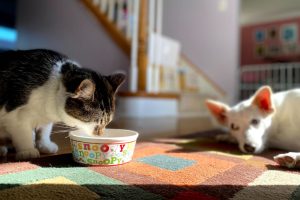Cats versus dogs: a common debate among pet owners. The question remains: why are cats more low maintenance than dogs?
The differences in grooming needs between cats and dogs
Cats requiring less frequent grooming sessions due to self-cleaning habits.
Cats are notorious for their meticulous self-cleaning habits, which means they require less frequent grooming sessions compared to dogs. Felines spend a significant amount of time grooming themselves, using their rough tongues to lick away dirt and debris. This self-grooming behavior not only keeps their coat clean but also helps distribute natural oils for a healthy shine. As a cat owner, you’ll spend less time brushing and bathing your feline friend, allowing for more quality bonding time.
In contrast, dogs often require regular grooming sessions to maintain their coat’s health and cleanliness. Depending on the breed, dogs may need to be brushed daily to prevent matting and tangling. Additionally, some dogs need regular baths to keep their skin and coat in top condition. This means more time and effort spent on grooming duties for dog owners compared to their feline-loving counterparts.
Extra Tip: Providing your cat with a scratching post can help promote their natural grooming behavior and keep their claws in good condition.
Feeding schedules for cats versus dogs
Unlike dogs, who typically need set meal times, cats have the unique ability to graze on food throughout the day. Felines are natural-born hunters and prefer to nibble on small meals multiple times a day. This grazing behavior reflects their carnivorous nature and allows cats to regulate their food intake based on their metabolic needs. As a cat owner, you have the flexibility to leave dry kibble out for your cat to snack on as they please, reducing the need for strict feeding schedules.
On the other hand, dogs are more accustomed to set meal times, where they are fed a specific portion of food in one or two meals a day. This feeding schedule ensures they receive the necessary nutrients for their size and activity level. Dog owners must adhere to a consistent feeding routine to prevent overeating or undereating, which can lead to weight and health issues.
Exercise requirements for cats and dogs
When it comes to exercise, cats are often viewed as more independent and low maintenance than dogs. While dogs require regular walks and playtime to stay physically and mentally stimulated, cats are natural athletes who engage in high-energy bursts of activity followed by long periods of rest. This means that cats can often entertain themselves with toys or chase imaginary prey around the house, making them less reliant on their owners for exercise.
Dogs, on the other hand, thrive on routine exercise and playtime to prevent boredom and excess energy. Depending on the breed, dogs may need daily walks, runs, or interactive play sessions to maintain their physical health and mental well-being. Dog owners must prioritize regular exercise to ensure their furry companions lead happy and healthy lives.
Dogs needing regular walks while cats can exercise independently indoors.
Forget about setting daily alarms for those early morning walks! Cats come with a built-in exercise routine that doesn’t involve leashes or outdoor expeditions. Their natural instinct to climb, chase, and explore keeps them active without the need for constant supervision. Meanwhile, dogs require regular walks for physical activity, making them more time-intensive than their feline counterparts. So, if you prefer a pet that can entertain themselves indoors, a cat might be the purrfect choice!
Healthcare needs for cats and dogs
When it comes to healthcare, cats typically require fewer vet visits and medications compared to dogs, keeping your schedule and wallet happier. Cats are known for their independent nature, often hiding signs of illness well. On the other hand, dogs may need more frequent check-ups and treatments due to their social and active lifestyles, making them higher maintenance in terms of healthcare. With a cat, you can enjoy fewer trips to the vet and potentially lower medical expenses, making them a low-maintenance pet choice when it comes to healthcare.
Additional insight:
– Dietary considerations: Cats have more specific dietary needs than dogs, making it easier to choose and maintain a consistent feeding routine for them. This can lead to fewer complications and diet-related health issues, contributing to their overall lower maintenance requirements compared to dogs.
Travel considerations for cat owners versus dog owners
Planning a weekend getaway or a long vacation? Cat owners have the advantage of leaving their independent feline companions at home with sufficient food and water, without the need for constant supervision like dog owners. Cats are generally more content to stay in a familiar environment, reducing the stress of travel arrangements and potential separation anxiety that can come with transporting dogs. So, if you’re a travel enthusiast looking for a low-maintenance pet, a cat might be the ideal companion for your adventures.
Cats being more adaptable to changes in their environment compared to dogs.
Cats are notorious for their independence and adaptability, making them more low maintenance than dogs in many ways. Unlike dogs, who often struggle with changes in their environment, cats tend to adjust more easily. Whether you’re moving to a new home or simply rearranging your furniture, cats are less likely to be stressed by these changes. Their natural curiosity and agility allow them to explore and acclimate to new surroundings with ease, requiring less attention and assistance from their owners.
Another factor that contributes to cats’ adaptability is their self-sufficiency. Cats are known for their grooming habits, keeping themselves clean without the need for regular baths. This self-maintenance reduces the amount of time and effort required from owners in maintaining their pet’s hygiene. In contrast, dogs often need regular baths and grooming to keep them clean and healthy, adding to the overall maintenance and care required.
Overall, cats’ ability to adjust to changes in their environment with minimal fuss and their self-sufficient nature contribute to their reputation as more low maintenance pets compared to dogs.
Cost comparison between owning a cat and a dog
When it comes to the financial aspect of pet ownership, cats generally prove to be less expensive than dogs over their lifetime. From initial adoption or purchase fees to ongoing expenses like food, grooming, and medical care, owning a cat often costs less than owning a dog.
One significant cost difference lies in veterinary care. Dogs typically require more frequent visits to the vet for vaccinations, check-ups, and potential health issues, leading to higher medical expenses over time. On the other hand, cats tend to be less prone to health problems and may require fewer vet visits, resulting in lower medical costs for cat owners.
Additionally, cats are often smaller in size than dogs, leading to savings in food costs. Cats generally eat less than dogs, making their food expenses more budget-friendly. Grooming costs are also typically lower for cats, as their grooming needs are minimal compared to many dog breeds.
Taking into consideration these cost factors, it becomes evident that owning a cat is generally less financially demanding than owning a dog over the course of their lifetime.
Cleaning routines for cat owners and dog owners
When it comes to cleaning routines, cat owners can often enjoy a more streamlined and less time-consuming process compared to dog owners. Cats are instinctively clean animals, frequently grooming themselves to maintain their hygiene. This means less effort required from owners in terms of bathing and grooming their feline companions regularly.
In addition, cats are known for using a litter box for their bathroom needs, eliminating the need for daily walks outside like many dogs require. This indoor bathroom behavior simplifies the cleaning routine for cat owners, as they only need to scoop and change the litter box regularly.
On the other hand, dogs need to be taken outside multiple times a day for bathroom breaks, adding an extra chore to the cleaning routine of dog owners. Cleaning up after dogs during walks or in the yard is also a regular task that cat owners may not have to deal with.
Overall, the cleaning routines for cat owners are often more straightforward and require less time and effort compared to those of dog owners. This factor contributes to the overall lower maintenance requirements of cats as pets.
Cats’ litter box maintenance versus the need for dog walks and waste cleanup
Cats have the upper paw when it comes to maintenance thanks to their litter box habits. Unlike dogs that need to be taken outside for walks and require their waste to be picked up, cats are self-sufficient in this area. Simply provide them with a clean litter box, and they will take care of their business on their own. This means no early morning or late-night walks in the rain or snow; cat owners can enjoy the convenience of having their pets take care of their bathroom needs indoors. Less time spent cleaning up after your pet means more time for cuddles and play.
Unique insight: While dogs often need their owners to head out for walks multiple times a day, cats can entertain themselves indoors. This independent nature makes cats more low maintenance than dogs, as they don’t require constant supervision or physical activity to keep them happy and healthy.
Exploring why cats’ independent nature makes them more low maintenance than dogs
Cats have a reputation for being independent creatures, and this plays a significant role in why they are more low maintenance than dogs. Unlike dogs that thrive on constant attention and companionship, cats are content to entertain themselves for long periods. Their independent nature means they don’t mind being left alone for extended periods, making them a great choice for busy individuals or those who travel frequently. Cats are also fastidious groomers, keeping themselves clean and reducing the need for regular baths or grooming appointments. This self-sufficiency allows cat owners to spend less time tending to their pets’ needs and more time simply enjoying their company.
Interesting facts about cats and dogs
- Cats have a unique way of communicating: While dogs bark, cats meow, purr, hiss, and even chirp to communicate with their human companions. Understanding these different vocalizations can help you better understand your feline friend’s needs and moods.
- Dogs have an incredible sense of smell: A dog’s sense of smell is up to 10,000 times more powerful than humans’, making them invaluable for tasks such as search and rescue, detecting drugs or explosives, and even sniffing out medical conditions in humans.
- Cats are more agile than dogs: Cats are known for their impressive agility, able to leap to great heights and balance on narrow surfaces with ease. This agility stems from their evolution as hunters, allowing them to stalk and pounce on prey with precision.
Uncovering fun trivia about these beloved pets to round out the discussion.
Feline Fact: Did you know that cats are one of the few animals that domesticated themselves? That’s right! Cats chose to live alongside humans to take advantage of the pest control opportunities.
Purr-fect Sound: Cats have a unique purring ability that is not just a sign of contentment. It’s also a form of self-healing, as the vibrations help soothe their body and promote bone growth.
Clean Freaks: Cats are notorious for their grooming habits, spending around 30% of their waking hours cleaning themselves. This fastidious behavior makes them naturally low maintenance pets compared to dogs.
Nap Experts: Cats are true masters of relaxation, with the ability to sleep up to 16 hours a day. This means they require less interactive playtime and exercise compared to dogs, making them a great choice for busy individuals.
Next time you spend quality time with your feline friend, impress your friends with these unique trivia facts that showcase the fascinating world of cats.
Alex, a passionate animal lover, has experience in training and understanding animal behavior. As a proud pet parent to two dogs and three cats, he founded AnimalReport.net to share insights from animal experts and expand his knowledge of the animal kingdom.









